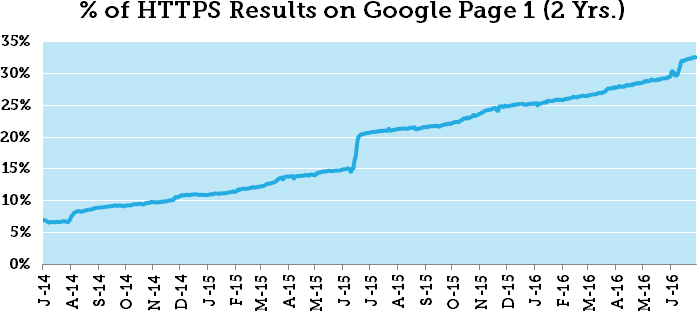As of late June, 32.5% of sites featuring on page one of Google’s search results now use the HTTPS protocol, according to a new study from Moz.
The well-respected Dr. Pete Meyers published a blog post last week on the data they’ve been tracking over a two year period since Google announced HTTPS was to be introduced as a light ranking signal.
The results should be enough to give SEOs serious pause for thought when it comes to considering whether to switch their sites to the secure protocol.
What is HTTPS?
If you need a quick HTTPS refresher, take a look at our SEO’s guide:
“HTTPS (Hypertext Transfer Protocol Secure) is a communication protocol that protects the integrity and confidentiality of your users’ data between their device and your website. For example, when a user enters data into a form on your site in order to subscribe to updates or purchase a product, HTTPS protects that user’s personal information.
Data sent using HTTPS is secured via a Transport Layer Security protocol (TLS), which provides three key layers of protection:
- Encryption – keeping exchanged data secure from eavesdroppers. That means that whilst the user is browsing, nobody can “listen” to their conversations, track their activities or steal their information.
- Data integrity – protecting data to ensure that it cannot be modified or corrupted during transfer, intentionally or otherwise, without being detected.
- Authentication – clarifying that the user is communicating with the intended source. It protects against man-in-the-middle attacks and builds trust, which translates into other benefits.”
Looking back to 2014
Two years ago, Searchmetrics found little difference between HTTP and HTTPS rankings after Google’s initial announcement. Hardly surprising, as at the time it only affected 1% of results.
Moz also saw very little initial difference. Prior to August 2014, 7% of page one Google results used the HTTPS protocol. A week after the update announcement, that number increased to 8%.
HTTPS in 2016
Moz found that a third of page one Google results now use HTTPS:

As Dr. Meyers points out, due to the gradual progression of the graph, this probably isn’t due to specific algorithm changes, as you would normally expect to see see sharp jumps and plateaus. Instead, it may mean that Google’s pro-HTTPS campaign has been working, just slower than expected.
Google has successfully led marketers and webmasters to believe that HTTPS sites will be rewarded, and this has drastically sped up the shift.
Looking ahead, it’s likely that in two years, HTTPS uptake may be closer to 50% and algorithm changes will further cement the protocol’s importance in the eye’s of the mighty.

Comments are closed here.